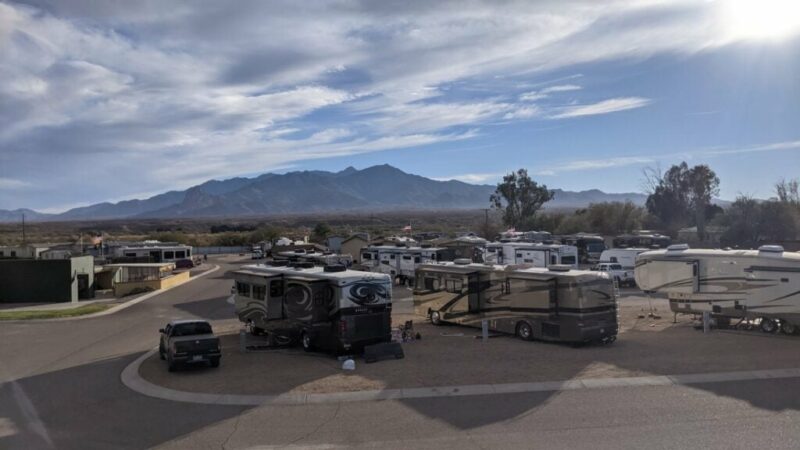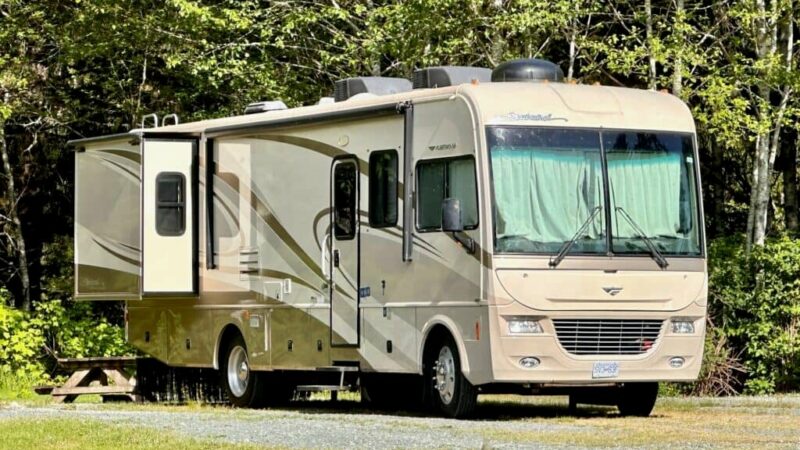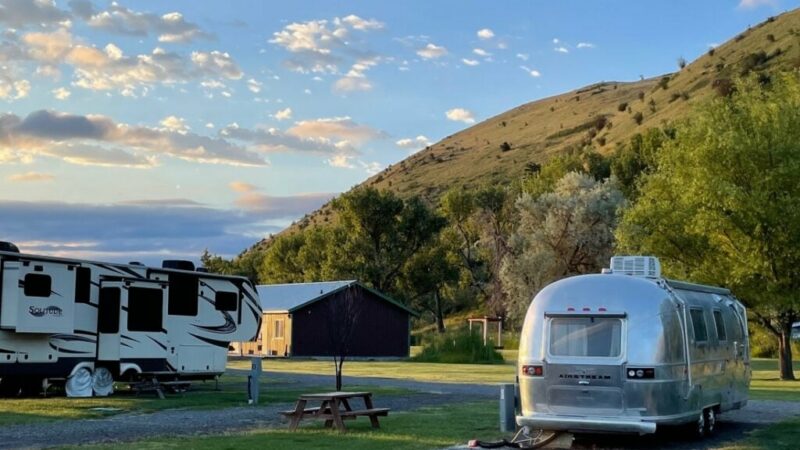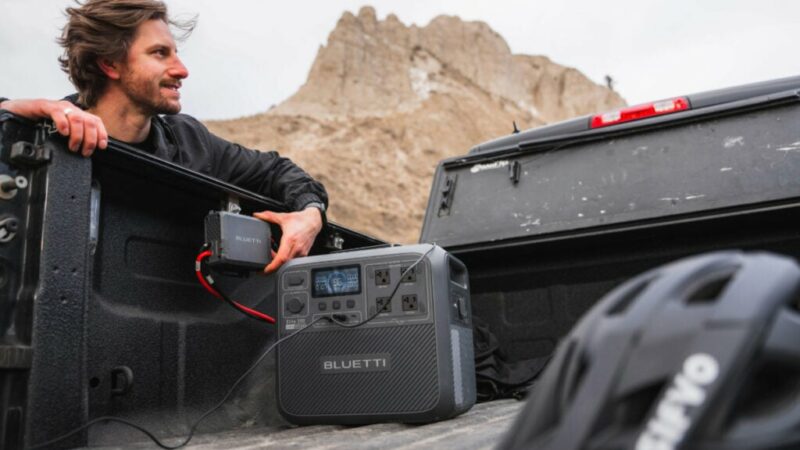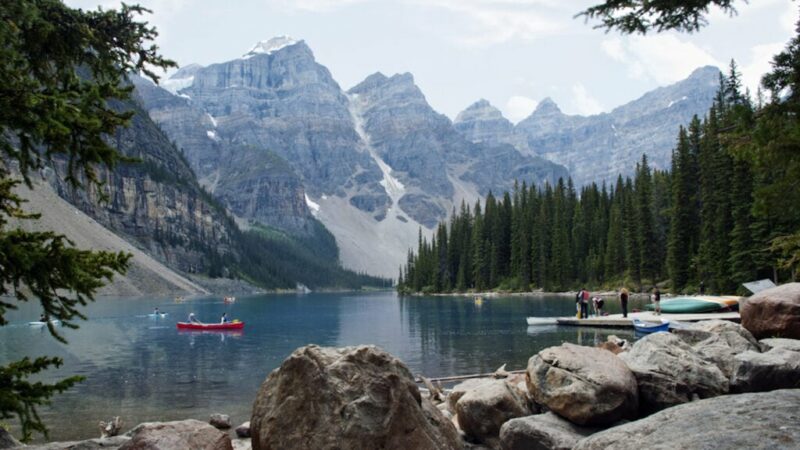RV Speak: A Definitive Guide to RV Terms

Navigating the Lingo: Understanding Common RV Terms
With many of our kiddos back in school, we thought now would be the perfect time for a learning session of our own. to If you’re new to the world of RVing, you’ve probably noticed that RVers seem to have their unique language regarding RVs. If the RV jargon used on RV social media groups and RVing forums, like iRV2 Forums, baffles you, we’re here to help. In this definitive guide to RV terms, we’ll tell you what RVers talk about when they talk RV Speak.
RV Terms for Types of RVs
Every RVer has different needs and tastes when it comes to camping. There are a lot of different categories of RVs, and one or more are designed to suit each traveler.
Motorized RV Terms
A motorhome is an RV that is on a motorized chassis. Motorhomes are categorized into different classes according to their build. Here’s what is what when it comes to RV classes:
Class A Motorhome
A Class A motorhome is a large, luxury motorhome that more or less resembles a bus. Class A motorhomes can be different lengths, but they are always well-appointed with the comforts of home.
Diesel Pusher
A diesel pusher is a Class A with a diesel engine located at the back of the motorhome.
Class B Motorhome
Class B motorhomes are basically van conversions. They are the smallest motorhome and are loved for their ability to camp effortlessly in places where a larger RV won’t fit.
Class B+ Motorhome
The term Class B+ is imaginary ad-speak. If you see anything labeled as a “Class B+,” it’s a Class C. Don’t fall for the hype.
Class C Motorhome
A Class C motorhome is distinguished from other types of RVs by the bunk (sometimes a large storage area) over the cab. Most Class C’s are on a heavy-duty van chassis. This classification also includes so-called “Super C motorhomes,” which are simply large Class C’s.
Bus Conversion
A bus conversion is a motorcoach that’s been converted into a rolling home. Bus conversions are often a creative and artistic expression of their owners, with amenities like clawfoot bathtubs and home furnishings in them.
Toy Hauler
A toy hauler is a motorhome with a garage area at the back that can be used to transport ATVs, motorcycles, e-bikes, a portable hot tub, and whatever else makes a camper’s heart sing.
Skoolie
A skoolie is a school bus that’s been lovingly converted into a home on wheels.
Campbulance
A campbulance is an ambulance that’s been converted into an RV. Inside, campbulances are very much like Class B motorhomes with all the basics and maybe a few choice extras.
Towable RV Terms
Towable RVs include all trailer types (for obvious reasons), as well as truck campers (for not so obvious reasons).
Travel Trailer
Travel trailers are bumper-pull trailers that typically range between 10 and 40 feet. Larger travel trailers and/or smaller tow vehicles usually require a weight distribution hitch (WD) and sway bars to maintain stability.
Fifth-wheel
A fifth-wheel hitch (or saddle) mounted in the bed of a pickup truck is used to tow these rigs. The cool kids call them fivers.
Toy Hauler
A toy hauler is a travel trailer or fifth-wheel with a garage area at the back that can be used to transport ATVs, motorcycles, e-bikes, a portable hot tub, and whatever else makes a camper’s heart sing.
Truck Camper
A truck camper is a camper that mounts on the bed of a pickup.
Pop-up Camper
A pop-up camper is a camper that folds down into a lightweight, compact trailer for transportation. There are three types of pop-up trailers:
A-Frame
An A-frame trailer is a hard-sided popup camper.
Tent Trailer
A tent trailer is a soft-sided pop-up camper.
Hybrid Trailer
A hybrid trailer combines the pop-out sections of a tent trailer and the hard sides of an A-frame trailer.
RV Setup Terms
Vintage Camper
Any trailer or motorhome more than 25 years old that has been refurbished to like-new condition.
Rig
The term “rig” refers to any RV setup. When referring to someone else’s RV, the term rig is used in a complimentary way, such as: “Nice rig. Sweet setup.”
TV
While most RVs have at least one television, RVers usually mean the vehicle used to tow a trailer when they use this acronym for “tow vehicle.”
Dinghy Vehicle
A dinghy is a smaller vehicle that’s towed behind a motorhome on a dolly, trailer, or that is flat-towed.
Toad
A toad is another word for a dinghy.
Types Of Camping
There are many different ways you can camp in an RV. RVers have terms for every one of them. Here is a list of RV camping terms you’ll probably come across if you haven’t already.
Boondocking
Boondocking is camping without any hookups or connections, usually far away from developed areas. Online courses like Boondocking 101 Masterclass offer a more in-depth look at successful boondocking practices.
Dry Camping
Dry camping is camping without any services or hookups. The term “dry camping” is often used interchangeably with the term “boondocking.” However, while boondocking usually means camping away from development, dry camping can be done anywhere. For example, you could dry camp in your RV in a parking lot, at a campsite, or at a Harvest Host or Boondockers Welcome location.
Overlanding
Overlanding is camping in remote places that are only accessible by 4×4 roads and trails. Overlander RVs are typically designed with this in mind, and although they have most of the amenities you’ll need to be comfortable, they have design features that make them far more rugged than any other type of RV.
Moochdocking
Moochdocking means driveway camping in a friend or relative’s driveway for free. Moochdockers frequently have access to 110-volt power and may or may not have a connection to water hookups.
Wallydocking
Many Walmarts offer overnight camping to RVers traveling through the area. Camping in a Walmart parking lot is known as Wallydocking. When Wallydocking, the etiquette suggests that RVers ask a manager for permission to stay overnight first.
At some point in their stay, Wallydockers buy things from the store. They try to camp as inconspicuously as possible. To be inconspicuous, Wallydockers should never put out awnings, set up firepits, or set up camping chairs.
Stealth Camping
Stealth camping, a technique employed by RVers in vans or Class B RVs, involves discreetly setting up camp in developed areas with the intention of blending in and remaining unnoticed. Often used as a means of making a quick stop en route to a destination, the goal of stealth camping is to make the most of the journey without drawing attention to oneself
Workamping
Work camping (or “workamping”) is camping somewhere for at least a short period in exchange for services. Examples of workamping positions include campground host, farm laborer, and Amazon warehouse employee.
RV Systems: RV Terms Used Often
Full Hookups
The term “full hookups” means you can connect your RV to sewer, water, and power at the campsite.
Shorepower
Shore power is a 110/120V, 30-amp, or 50-amp campsite electrical connection.
Black Tank
The black tank is a tank mounted under the RV that collects and stores all the waste from the toilet.
Gray Tank
The gray tank collects and stores all the soapy water used in the RV sinks and showers.
Stinky Slinky
The RV sewer hose is often called a “stinky slinky” because it resembles a child’s toy.
Freshwater Tank
The RV freshwater tank is used to store water for use when boondocking or dry camping.
City Water
City water is a water connection directly to the RV from any faucet or spigot. When connected, you don’t need to use your freshwater tank or your water pump.
Cabin
On motorhomes, the term cabin means the living area of the RV as opposed to the front seat area.
Cockpit
The cockpit is where the driver’s seat and controls are located in a motorhome.
Coach
This is another name for a Class A or Class C motorhome. It can also mean the living area of a trailer of any type.
Chassis
The chassis of an RV is the underlying frame or structure that supports the body and all the other components of the vehicle. It is the foundation of the RV, and it holds the wheels, engine, drivetrain, suspension, and all other mechanical parts.
Basement
The basement is part of the coach that is under the cabin. Basements frequently contain accessible storage bays, batteries, and plumbing components.
Garage
Many RVs now have a large storage area that is separate from the main cabin, which can be used to store bikes, motorcycles, or just about everything else you need to have fun while camping.
Slideout (Slide)
A slideout (commonly called a slide) is a small living space that can be extended from the side of the RV to add more living area when you are camped. Before you hit the road, a push of a button will cause small motors to bring the slideout into the interior of the RV until you camp again.
DC Power
This part of the electrical system runs on 12-volt battery power. Components powered by the DC electrical system include the interior lights, water pump, furnace, inverter, stereo, and sometimes the fridge.
AC Power
This part of the electrical system runs on 110/120-volt shorepower. Components powered by the AC electrical system have higher voltage draws, including the air conditioner, microwave, fridge (when set to AC), AC outlets, TV, electric stovetops, and converter.
Converter
The RV converter converts 110/120-volt AC current into DC current to run your RV’s 12-volt appliances and charge its battery.
Inverter
The RV inverter changes the 12-volt electricity from the batteries into usable 110/120-volt electricity to run AC appliances in your RV.
Solar Array
An RV solar array simply means the solar panels connected to your RV’s solar power system.
Stabilizer Jacks
Stabilizer jacks are intended to keep the RV from rocking when parked. They should never be used to level the RV.
Anderson Levelling Chock
This is a moon-shaped wheel chock used to level the RV from side to side.
A-frame (Tongue) Jack
An A-frame jack is used on a travel trailer to lift and lower the hitch.
RV Terms for Different Types of RVers
There are at least as many types of RVers out camping as there are RVs. Here are a few of the terms for campers you’ll hear about on any online RV group or forum.
Newbie
An RV newbie is a new or first-time RVer. They spend a lot of time watching RV-related YouTube videos. RV newbies are still learning about their unit and are sometimes shocked when things go awry and need repairing.
Full-Timer
A full-timer is a dedicated RVer who has often sold, thrown out, or given away a houseful of stuff to hit the road in their RV permanently. Full-timers consider their RV to be their permanent residence, although they may have a permanent domicile address somewhere in Texas or through a mail-forwarding company like Escapees.
Part-Timer
A part-timer is more casual about RVing than a full-timer. They have a permanent sticks and bricks residence but travel and camp in their RV for short periods throughout the year.
Snowbird
Snowbirds like to have the best of both worlds, so they spend spring and summer in the North. At the first hint of a chilly breeze, snowbirds pack their RVs and flock South to the warmest states for the fall and winter seasons.
Nomad
The travel bug has truly bitten nomads. Although they will almost always have an area that is a home base, a nomad is permanently on the move. Nomads thrive in new environments and frequently spend at least half their waking hours working remotely while researching new travel destinations. Nomads sometimes travel around the country, working seasonal workamping jobs as they become available.
Vanlifer
A vanlifer is loosely defined as someone who has set up a small, medium, or large van with everything they need to live a happy and comfortable life on the road. Vanlifers are typically (but not always) 20–40 years old and may be employed in remote jobs in the tech industry.
Camping Queen
A camping queen is an RVer who will only camp at full-service campgrounds.
Campground Jerk
A campground jerk is the RVer who has no consideration for other campers. He is the one who allows his off-leash labrador to run rampant through the campground or leaves trash outside at night to attract bears and other wildlife. A campground jerk frequently has a great stereo, really loves beer and classic rock, and doesn’t care who knows it. We all have a campground jerk story.
Miscellaneous RV Terms and Jargon
Here are a few other RV terms you may hear or read.
Winterize
The term “winterize” means getting the RV ready for winter storage by emptying tanks, water lines, and the water heater. Many RVers fill waterlines with RV antifreeze when the lines are empty.
Skirting
Skirting is wind-blocking insulation used around the base of the RV, typically in the winter months. It helps the RV conserve heat and may help keep tanks and pipes from freezing. RVers may choose professionally installed vinyl or rigid insulation boards as skirting. Some RVers use AirSkirts. These heavy-duty airbags fit under the RV to keep cold air out.
Sticks-and-Bricks
A sticks-and-bricks is a traditional residential house or apartment that is built to stay in one place.
Poop Pyramid
Lastly, let’s talk about the oh-too-real and dreaded poop pyramid. A poop pyramid is not an exotic travel destination. A poop pyramid is a buildup of solid material in the black tank directly underneath the toilet. When enough material builds up, it plugs the toilet, so you won’t be able to flush it.
A poop pyramid happens when the black tank valve is left open. Newbies sometimes open the black tank valve when hooked up to a sewer connection. It also occurs when there is not enough water in the black tank. Clearing a poop pyramid is never fun. Luckily you can avoid the dreaded poop pyramid by allowing your black tank to fill up before emptying it and then immediately refilling it with about 6 gallons of water and a tablespoon of non-formaldehyde holding tank treatment. You should always use septic-safe toilet paper in your RV and flush with plenty of water.
What are other RV terms we can add to this list? Share your favorites in the comments!
The post RV Speak: A Definitive Guide to RV Terms appeared first on RV LIFE.
Source: https://rvlife.com/rv-speak-a-definitive-guide-to-rv-terms-and-jargon/

